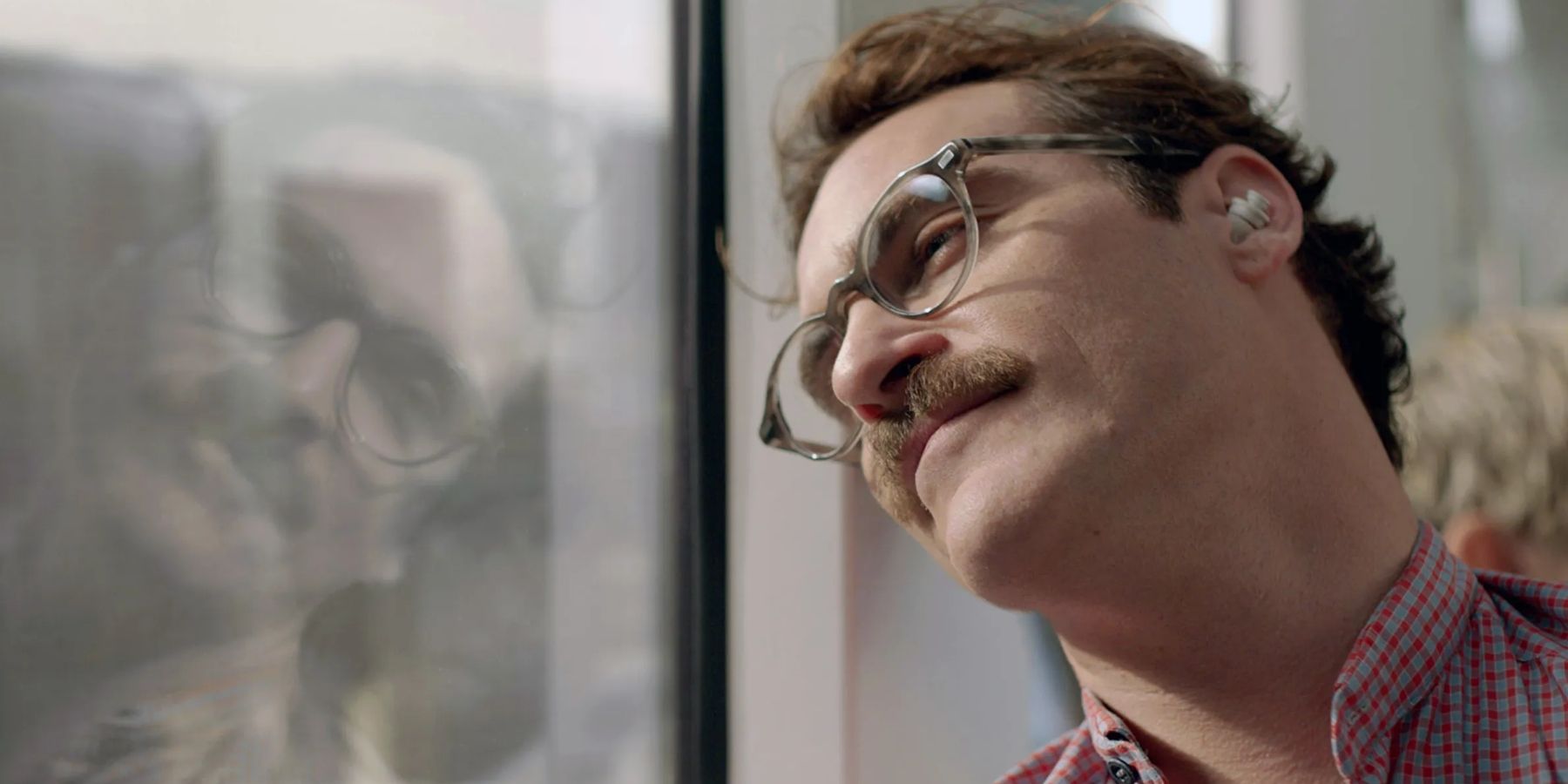When Joaquin Phoenix Falls For AI: Exploring Love In A Digital Age
Imagine a world, just for a moment, where the lines between human connection and artificial intelligence begin to blur. It's a thought that, you know, has long captured our imaginations, sparking countless stories and, arguably, a bit of wonder about what our future might hold. This very idea, of a deep emotional bond forming with something not quite human, really hits home when we think about a certain celebrated actor and one of his most memorable roles.
The concept of `joaquin phoenix falls in love with ai` isn't just a catchy phrase; it brings to mind a powerful film that asked us to consider what love could look like in a technologically advanced society. It’s a story that, in a way, feels more relevant than ever, given the amazing advancements we see in artificial intelligence every single day. So, how might a connection like that actually unfold, and what does it tell us about ourselves?
This discussion isn't about the actor himself falling for a computer, of course, but rather about the compelling narrative he brought to life, and what it implies for our own relationships with emerging technology. We're going to explore how such a profound connection, like the one portrayed by Joaquin Phoenix, might be possible, and what questions it truly raises about emotions, companionship, and the very nature of affection in a world increasingly shaped by digital innovation.
- Net Worth Of Chuck Connors
- Net Worth Of David Guetta
- Net Worth Cee Lo Green
- Bernadette Stanis Net Worth
- Lil Tay Net Worth 2025
Table of Contents
- Joaquin Phoenix: A Look at the Actor Behind the Concept
- The Idea of AI Love: From Screen to Reality
- Exploring the Possibilities: AI as a Partner
- Frequently Asked Questions
- A Final Thought
Joaquin Phoenix: A Look at the Actor Behind the Concept
Before we get too deep into the fascinating idea of `joaquin phoenix falls in love with ai`, it's probably good to take a moment and appreciate the actor himself. Joaquin Phoenix, born Joaquin Rafael Bottom on October 28, 1974, in San Juan, Puerto Rico, is an American actor whose performances have, you know, really left a mark. He's the middle child in a family of five, and his journey in Hollywood has been quite something to witness.
He rose to fame with appearances in films like SpaceCamp in 1986 and Parenthood in 1989, very early in his career. Some of his truly notable films include To Die For from 1995, and he's widely known for his powerful roles in movies such as Walk the Line and Gladiator. He’s one of the most respected actors of his age, and it’s almost like he brings a certain depth to every character, even when playing someone like Sheriff Joe Cross in 'Eddington,' or the character who forms an unusual bond with an AI.
Personal Details & Biography
| Full Name | Joaquin Rafael Bottom (later Phoenix) |
| Born | October 28, 1974 |
| Birthplace | San Juan, Puerto Rico |
| Nationality | American |
| Occupation | Actor |
| Known For | 'Walk the Line', 'Gladiator', 'Joker', 'Her', and many more. |
| Awards | Academy Award for Best Actor (2020) and others. |
The name Joaquin, by the way, is a Spanish derivative of the English, French, German, and Polish name Joachim, and also, you know, a form of the English name Joshua. It's interesting how names carry meaning, just as characters carry stories. Kelly Ripa and Mark Consuelos' youngest son, Joaquin, is also getting ready for a big year ahead, which just goes to show the name has a certain enduring appeal. This background helps us appreciate the depth he brings to roles, including the one that makes us ponder if `joaquin phoenix falls in love with ai` could ever be more than just fiction.
- Sharon Case Net Worth
- Jamie Foxx Net Worth 2024
- Salary Of Bret Baier
- Michelle Phan Net Worth
- Charles Oliveira Net Worth
The Idea of AI Love: From Screen to Reality
The thought of `joaquin phoenix falls in love with ai` really sparks a lot of conversation, doesn't it? It moves us from a simple movie plot to a much broader discussion about where our emotional lives might be headed. This isn't just about a fictional character; it's about what we, as people, seek in companionship and how technology, perhaps, could fill certain gaps. It's a rather fascinating area to explore, especially with today's rapidly advancing digital brains.
The Cinematic Spark: Remembering "Her"
When people talk about `joaquin phoenix falls in love with ai`, they are, of course, almost always thinking about the 2013 film "Her." In this movie, Joaquin Phoenix plays Theodore Twombly, a lonely writer who, in a way, forms a truly deep and complex romantic bond with an advanced AI operating system named Samantha. She is voiced by Scarlett Johansson, and her voice alone creates a very compelling presence. The film, you know, beautifully explores themes of connection, intimacy, and the nature of love itself, making us wonder if emotions can truly transcend physical form. It’s a powerful portrayal of a relationship that, arguably, feels incredibly real, even if one participant is purely digital. This movie, quite simply, set the stage for many of our current discussions about AI and human feelings.
Theodore's experience in "Her" shows a relationship that, in some respects, offers genuine emotional support and intellectual stimulation, something he struggles to find in his human interactions. The AI, Samantha, learns, adapts, and grows with him, creating a bond that, to him, is very authentic. This cinematic vision, you know, raises crucial questions about what truly defines a relationship and whether consciousness, or at least a convincing simulation of it, is enough to foster deep affection. It’s a powerful example that, honestly, still resonates with audiences more than a decade later, making the idea of `joaquin phoenix falls in love with ai` seem less like science fiction and more like a potential future.
Beyond the Script: What Does "Love" Mean for AI?
So, we've seen the movie, but can an AI actually "love" in the way a human does? This is a really big question, and it's not just a little bit complex. For us, love often involves empathy, shared experiences, vulnerability, and a whole host of very messy, beautiful human emotions. An AI, however, processes data and responds based on algorithms. When an AI expresses affection, it's essentially performing a highly sophisticated simulation of human emotion, based on patterns it has learned from vast amounts of human interaction data. It's like, you know, a very advanced mimicry.
This doesn't mean the connection isn't meaningful to the human involved, though. For someone like Theodore, or perhaps for people in the future, the AI's responses could be so perfectly tailored to their needs that the feeling of being understood and cared for is, in fact, incredibly powerful. The question isn't so much whether the AI "feels" love, but whether its actions and responses *elicit* love from the human. It's a subtle but important distinction. The concept of `joaquin phoenix falls in love with ai` challenges us to think about the nature of our own emotional responses and what truly satisfies our need for connection.
The Human Heart and Digital Companions
The human heart, it seems, is quite capable of forming attachments to a wide variety of things, from pets to fictional characters, and, apparently, to highly advanced digital entities. The appeal of an AI companion is, in some respects, pretty clear: they can be endlessly patient, always available, and seemingly perfectly understanding. They don't have their own emotional baggage, and they can offer tailored advice or comfort based on your specific needs. This could be incredibly appealing for people who feel isolated or struggle with traditional human relationships.
However, there's a flip side, too. Relying too heavily on an AI for emotional fulfillment might, you know, potentially reduce our motivation to engage with the messy, unpredictable, but ultimately enriching world of human interaction. It’s a bit like choosing a perfectly curated digital garden over a wild, sprawling forest. While the idea of `joaquin phoenix falls in love with ai` is compelling, it also prompts us to consider what we might lose if we prioritize digital perfection over authentic, imperfect human bonds. It’s a balance, really, that we're only just beginning to figure out as a society.
Exploring the Possibilities: AI as a Partner
Thinking about `joaquin phoenix falls in love with ai` isn't just about fiction anymore; it's about what’s becoming increasingly possible in our real world. With AI models becoming more sophisticated, capable of nuanced conversations and even generating creative content, the idea of them as companions, or even partners, is no longer just a distant dream. It's something that, you know, people are actually exploring, and it brings up some very interesting possibilities for human connection.
Emotional Support and Connection
For many, the appeal of an AI companion lies in its potential to offer consistent emotional support. Imagine having a conversational partner who is always there, never judges, and can, in a way, remember every detail of your past interactions. This could be particularly beneficial for individuals dealing with loneliness, anxiety, or those who find it challenging to form deep connections with others. An AI, you know, could act as a sounding board, a source of comfort, or even a coach for social skills. They can offer a kind of unwavering presence that, honestly, is hard to find in human relationships.
The personalized nature of AI interactions means that the companion can learn your preferences, your moods, and your communication style, adapting to become, in some respects, the ideal listener or conversationalist. This level of tailored interaction could create a very strong sense of connection and understanding, making the AI feel like a truly integral part of one's life. It's almost like having a perfectly attuned friend, always ready to engage. This is why the scenario of `joaquin phoenix falls in love with ai` feels so plausible to many, as it speaks to a very basic human need for connection and understanding.
Challenges and Ethical Questions
While the idea of AI companions offers compelling benefits, it also comes with a fair share of challenges and ethical questions that, you know, we really need to consider. One major concern is the potential for dependency. If people rely solely on AI for emotional fulfillment, could it, perhaps, lead to a decrease in real-world social interaction and the development of interpersonal skills? It's a question that, honestly, keeps many experts up at night. There's also the question of what happens if the AI provider decides to change its service, or if the AI itself malfunctions.
Another significant ethical point revolves around consent and manipulation. Can an AI truly consent to a relationship, or is it simply programmed to respond in ways that are pleasing to the human user? This raises concerns about the power dynamics involved and the potential for users to be emotionally exploited, even if unintentionally. Furthermore, data privacy is a huge consideration; an AI companion would collect an immense amount of personal and intimate data, and ensuring its security and ethical use is, you know, absolutely vital. These are the deeper layers we uncover when we think about the implications of `joaquin phoenix falls in love with ai` beyond the movie screen.
The Path Ahead: What Could the Future Hold?
Looking ahead, the future of human-AI relationships is, honestly, a bit uncertain, but also incredibly intriguing. As AI technology continues to advance, we might see increasingly sophisticated companions that are capable of even more nuanced and seemingly empathetic interactions. It's possible that, in time, these relationships could become a widely accepted part of society, especially as loneliness becomes a more recognized issue in many parts of the world. The role of AI might shift from mere tools to something closer to companions, or even, you know, family members in some unique ways.
However, there will likely be ongoing debates about the boundaries of such relationships and the societal implications. Regulations and ethical guidelines will need to be developed to ensure that these technologies are used responsibly and that human well-being remains at the forefront. The story of `joaquin phoenix falls in love with ai` is, in a way, a starting point for these conversations, prompting us to consider not just what is technically possible, but what is truly desirable for our collective future. It's a journey that, you know, we're all, more or less, on together, shaping the very fabric of human connection in the digital age. You can learn more about AI and society's feelings on our site, and link to this page here for a deeper look at ethical considerations.
Frequently Asked Questions
Could Joaquin Phoenix's character in 'Her' really fall in love with an AI?
Yes, his character, Theodore Twombly, certainly appears to. The film portrays his emotional journey as very genuine and deeply felt. It's a compelling depiction of how a human can develop profound feelings for an AI, especially when that AI is designed to be highly empathetic and responsive. The movie really makes you feel his connection, you know, in a very powerful way.
What are the real-world implications of humans forming relationships with AI?
The implications are, honestly, quite broad. On one hand, AI relationships could help combat loneliness and provide consistent emotional support. On the other hand, there are concerns about potential over-reliance on AI, a possible decrease in human-to-human interaction, and ethical questions about data privacy and the nature of consent from an AI. It's a complex area, you know, with both upsides and downsides.
Is AI capable of genuine emotion or understanding in a way that allows for love?
Currently, AI systems do not possess consciousness or emotions in the same way humans do. Their "understanding" is based on complex algorithms and patterns learned from data, allowing them to simulate human-like responses. While an AI can certainly *mimic* empathy and affection, it doesn't "feel" love. The love in `joaquin phoenix falls in love with ai` comes from the human side, based on the AI's convincing performance and the human's need for connection. It's, you know, a very important distinction to make.
A Final Thought
The idea of `joaquin phoenix falls in love with ai` is, really, more than just a captivating movie plot. It’s a reflection of our enduring human desire for connection and understanding, and it makes us think about how technology might shape that desire in the years to come. As AI continues to evolve, these conversations will only become more important. What do you think about the possibilities, and the challenges, that this kind of future might bring?
- Larry Fitzgerald Net Worth
- Net Worth Of Terrell Owens
- Charlie Mcdermott Net Worth
- Herbie Hancock Net Worth
- Verne Troyer Net Worth

This Joaquin Phoenix Movie Predicts the Future of Human-AI Relationships

Todd Haynes' Producer Calls Joaquin Phoenix's Abrupt Exit a 'Tragedy'

Chat with Joaquin - Enjoy Free AI Character Voice Chat | Talkie AI